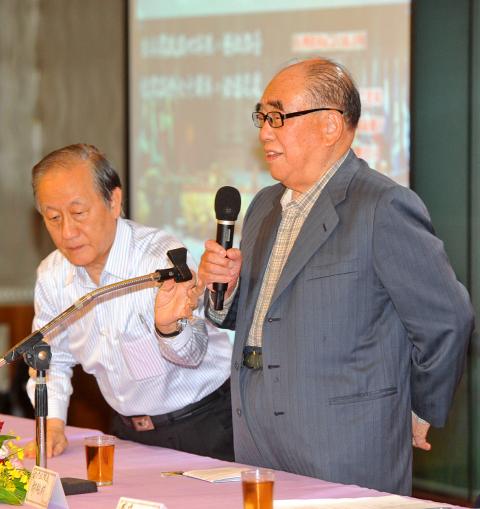Taiwan’s fate has never been, and will never be, determined by the Taiwanese themselves, former premier Hau Pei-tsun (郝柏村) told a seminar yesterday celebrating the 70th anniversary of Japan’s World War II surrender.
The seminar, organized by the New Chinese Children’s Association, celebrated “the anniversary of victory in the anti-Japanese war.”
According to the association’s Web site, the event was aimed at helping young people learn about the history of the Republic of China’s (ROC) anti-Japanese war, expose the recent “bandit ambition” of Japanese militarists and “debunk the lies fabricated by the Japanese bandits’ slaves who overstayed in Taiwan (滯臺倭奴) and who have distorted the real history.”

Photo: Wang Min-wei, Taipei Times
Hau had been invited to give the opening speech, and in it he urged young Taiwanese to learn the “real history.”
It was too bad that while there is now a 228 Memorial Day and 228 Peace Memorial Park, “Retrocession Day” is no longer a holiday in Taiwan and there is no “retrocession park,” said the 96-year-old retired general, who had also served as chief of the general staff and minister of national defense.
Retrocession Day used to be celebrated on Oct. 25 to mark Japan’s Oct. 25, 1945, surrender of Taiwan after 50 years of Japanese rule.
Hau talked about a recent trip to China, where he said he “braved” Chinese Communist Party officials by insisting that it was former president Chang Kai-shek (蔣介石) who led China to victory in the war.
He visited China in July to take part in commemorations of the 77th anniversary of the Marco Polo Bridge Incident, which is considered the start of the Second Sino-Japanese War.
Hau yesterday discussed the idea that Taiwanese are the master of their own fate.
“The notion that Taiwan’s future is to be decided by Taiwanese themselves, proposed by the Democratic Progressive Party, while [justifiable] from the perspective of democracy, runs afoul of practical politics,” Hau said.
“Taiwan’s future has never been decided by Taiwan itself,” he said. “When the Qing [Dynasty] ceded Taiwan to Japan [in 1895], was it up to Taiwanese? When Taiwan was restored [to the ROC in 1945], was it an outcome of Taiwan’s own decision?”
Hau said he was not opposed to the idea, but “it was not possible in the past, is not possible now and will not be possible in the future.”
“Taiwan’s future is the Republic of China’s future, and the ROC’s future ought to be decided by all Chinese people (中國人), the Zhonghua minzu [Chinese ethnic group, 中華民族],” he said.
Underlining the geopolitical predicament Taiwan faces in a world shaped by great powers, Hau said the only reasonable road is to identify with the Zhonghua minzu, insist on the legitimacy and authority of the ROC Constitution and cling to the “1992 consensus,” according to which both the ROC and the People’s Republic of China agree that there is only one China.
“Taiwanese independence is a dead end,” he said.
“Today’s Taiwan would not exist if it was not for the Republic of China’s success in the anti-Japanese war. The happiness and prosperity enjoyed by Taiwanese would not have been possible without the Chinese Nationalist Party [KMT] and its implementation of the Three Principles of the People,” he said.

The US government has signed defense cooperation agreements with Japan and the Philippines to boost the deterrence capabilities of countries in the first island chain, a report by the National Security Bureau (NSB) showed. The main countries on the first island chain include the two nations and Taiwan. The bureau is to present the report at a meeting of the legislature’s Foreign Affairs and National Defense Committee tomorrow. The US military has deployed Typhon missile systems to Japan’s Yamaguchi Prefecture and Zambales province in the Philippines during their joint military exercises. It has also installed NMESIS anti-ship systems in Japan’s Okinawa

‘WIN-WIN’: The Philippines, and central and eastern European countries are important potential drone cooperation partners, Minister of Foreign Affairs Lin Chia-lung said Minister of Foreign Affairs Lin Chia-lung (林佳龍) in an interview published yesterday confirmed that there are joint ventures between Taiwan and Poland in the drone industry. Lin made the remark in an exclusive interview with the Chinese-language Liberty Times (the Taipei Times’ sister paper). The government-backed Taiwan Excellence Drone International Business Opportunities Alliance and the Polish Chamber of Unmanned Systems on Wednesday last week signed a memorandum of understanding in Poland to develop a “non-China” supply chain for drones and work together on key technologies. Asked if Taiwan prioritized Poland among central and eastern European countries in drone collaboration, Lin

The Chien Feng IV (勁蜂, Mighty Hornet) loitering munition is on track to enter flight tests next month in connection with potential adoption by Taiwanese and US armed forces, a government source said yesterday. The kamikaze drone, which boasts a range of 1,000km, debuted at the Taipei Aerospace and Defense Technology Exhibition in September, the official said on condition of anonymity. The Chungshan Institute of Science and Technology and US-based Kratos Defense jointly developed the platform by leveraging the engine and airframe of the latter’s MQM-178 Firejet target drone, they said. The uncrewed aerial vehicle is designed to utilize an artificial intelligence computer

Renewed border fighting between Thailand and Cambodia showed no signs of abating yesterday, leaving hundreds of thousands of displaced people in both countries living in strained conditions as more flooded into temporary shelters. Reporters on the Thai side of the border heard sounds of outgoing, indirect fire yesterday. About 400,000 people have been evacuated from affected areas in Thailand and about 700 schools closed while fighting was ongoing in four border provinces, said Thai Rear Admiral Surasant Kongsiri, a spokesman for the military. Cambodia evacuated more than 127,000 villagers and closed hundreds of schools, the Thai Ministry of Defense said. Thailand’s military announced that